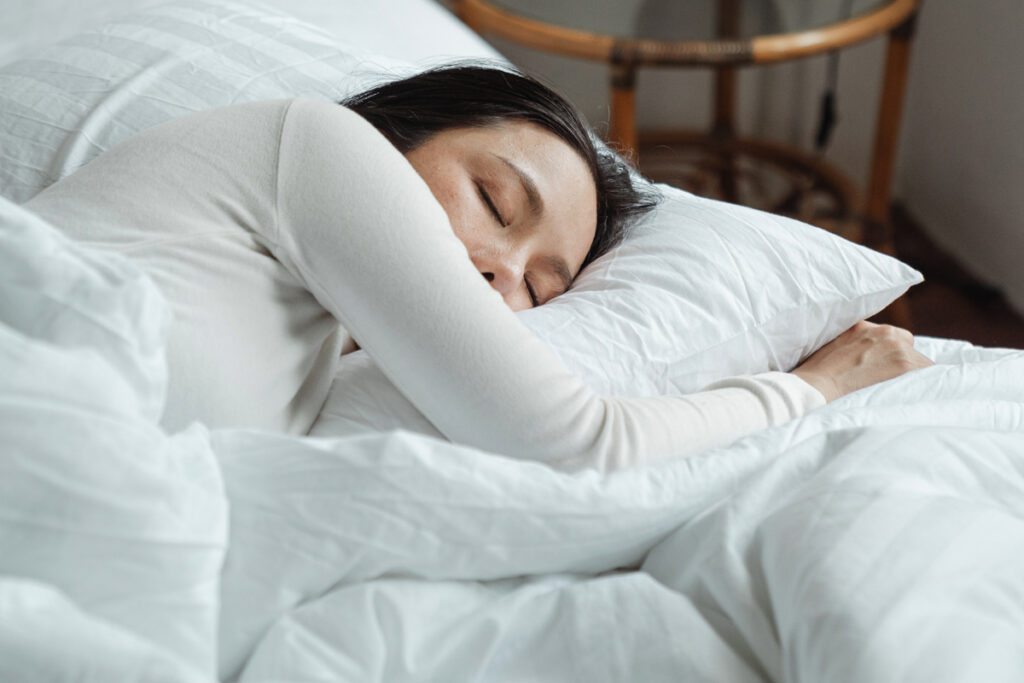Getting Your Zzzzzz’s
Tara Gidus Collingwood, MS, RDN, CSSD, ACSM-CPT

Sleep is essential for every single cell in our bodies. It is critical to our everyday functioning as human beings. Yet when we go through stressful times in our lives, sleep is often the first thing to go. I am a pretty good sleeper, but when something big is on my mind I will often wake up in the middle of the night with my thoughts spinning and can rarely fall back asleep.
I have heard from many of our fellow wisters that a regular sleep routine is one of the most difficult things to regain after losing a partner. From getting used to sleeping in the bed alone to the multitude of stressors that are on our minds, sleep escapes so many people desiring a peaceful night of uninterrupted sleep.
If a person is sleep deprived, a cascade of events happens inside the body, causing an imbalance of hormones. Leptin is a hormone in the body that signals to the brain that it feels satisfied or full. Ghrelin is another hormone that signals hunger. When someone isn’t getting enough sleep, leptin levels are lower and ghrelin levels are higher, leaving a person feeling hungrier and less satisfied throughout the day. In some studies, the sleep deprived report cravings for sweets and fatty foods. People who don’t get enough sleep tend to have higher body mass index (BMI) than those who do get their zzzz’s.
Lack of sleep can have various other short-term and long-term effects and health risks:
- Cognitive impairment: Trouble understanding, logical reasoning, becoming forgetful
- Mood: More feelings of fear, aggression, anger, anxiety, depression
- Cardiovascular health: Increased risk of high blood pressure, stroke, and heart attack
- Immune system: Higher risk of catching simple common colds but also more serious diseases such as certain cancers
- Brain disorders: Higher risk of developing dementia and Alzheimer’s disease.
The National Sleep Foundation recommends adults get between 7 and 9 hours of continuous sleep per night. However, it is not just the quantity, but the quality. Going through the stages of light, deep, and REM sleep are critical to repairing both the body and the brain throughout the night. Interruptions to sleep prevent spending enough time in each stage of sleep.
This May Help
- Regular exercise
- Promotes sleep and improves quality of sleep.
- Regular sleep and eating schedule
- Staying on a regular schedule during the week and on weekends can help the body find a routine to promote good sleep.
- Cold, quiet, dark
- Ideal thermostat setting is around 65 degrees.
- A dark environment helps promote the release of melatonin. Keep the room as dark as possible, especially while falling asleep.
- Quiet is best for sleep unless you need a white noise machine or fan that can help drown out louder noises that may cause you to wake up, like trains, sirens, or the neighbor’s barking dog.
- Bedtime routine
- o Start winding down 30 minutes before your desired bedtime by lowering the lights, getting into comfortable clothes, and turning off devices. A warm bath or shower may also soothe and help to relax.
- Proper bedding, mattress, and pillow
- Some wisters choose to get rid of their bed completely after losing their partner, while some choose a new mattress, moving furniture around, or switching bedrooms in the house. Starting anew can help with memories of your partner in bed and create a new environment.
- Pillows can make all the difference! Invest in one that works best for you!
- Tryptophan
- Amino acid found in protein foods that causes sleepiness
- Carbs help make tryptophan more available to the brain
- Ideal bedtime small snack has carbs and protein
- Cheese and crackers
- Cereal and milk
- Peanut butter on toast
- Granola and yogurt
- ½ turkey sandwich
- Warm milk or herbal teas
- Warm liquids in the stomach can promote relaxation and assist in falling asleep
- Milk has carbs and tryptophan
- May remind you of growing up and having milk before bed as a child so it could help promote falling asleep
- Melatonin
- Naturally occurring hormone in our bodies that regulates sleepiness
- Found in tart cherries, sunflower seeds, flax seeds
That May Hurt
- Caffeine
- Caffeine can be felt in the body within 15 minutes of ingesting. It acts as a mild stimulant, leaving you feeling awake and energized.
- Avoid caffeinated foods and beverages 6-8 hours before bedtime.
- Sources of caffeine: Coffee, tea, soft drinks, energy drinks, and a small amount in chocolate.
- Alcohol
- While alcohol may help you to get to sleep, it can disrupt sleep and prevent high-quality sleep.
- Staying on devices before bed
- Not only can they keep you up longer because you are scrolling through social media or watching a gripping TV show, but the light on the device can also prevent natural melatonin release.
- Move the TV out of the bedroom and definitely do not fall asleep with the TV on. Your brain will still be focusing partly on the noise and light and you will not get into proper deep and REM sleep.
- Dogs, cats, kids in the bed
- If your furry friend truly helps you to fall and stay asleep, keep them in the bed, but if you wake up sweating because of a big dog pressed against you or with a pile of fur in your face, consider having them sleep in their own bed inside or outside of the bedroom.
- Kids in the bed can be a problem for many reasons. I never had my kids in the bed when they were little except for about 2 months after Stephen died. We all needed the comfort, but after a few months I knew it was time for all of us to have our own space.
- Large meals
- Eating a large meal close to bedtime
- Gastroesophageal Reflux Disease (GERD)
- A backflow of acid into the esophagus called reflux can cause nighttime heartburn, coughing, choking which can lead to insomnia and poor sleep quality.
- Overweight or obese
- Carrying extra pounds, especially in the stomach and neck, can compromise breathing, leading to sleep apnea and low-quality sleep.
- Sleep apnea has been linked to fatigue and increased risk of high blood pressure, heart disease, and stroke.
Pay close attention to what, when, and how much you are eating to promote a better night’s sleep. Keep a sleep diary if this is something you really struggle with. Record bedtimes, wake times, time spent awake in the middle of the night. In addition, record things such as alcohol, caffeine, medications, supplements, noise disruptions, and other things that might be contributing to a poor night of sleep. Bring the diary to a sleep expert if you are struggling with proper sleep.
If you are looking for more resources, my favorite book on this topic is Why We Sleep by Matthew Walker. He also has several TED talks. Go to TED.com and search on his name to see various sleep-related topics. My favorite and most comprehensive is called Sleep Is Your Superpower. I highly recommend spending 18 minutes to watch this TED talk. Your body and brain will thank you!
Tara Gidus Collingwood, MS, RDN is a Registered Dietitian Nutritionist, Certified Personal Trainer, and fellow Wister. You can find her at dietdiva.net.

